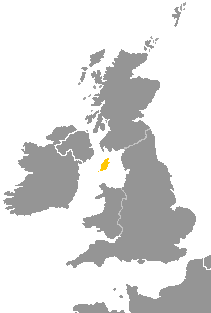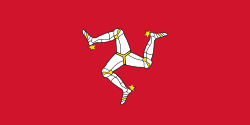Manx (språk)
| manx | |
| Gaelg, Gailck | |
| Uttal | [ɡilk], [ɡilɡ] |
|---|---|
| Talas i | |
| Antal talare | 1 689 (2001)[1] |
| Språkfamilj | Indoeuropeiska språk |
| latinska | |
| Officiell status | |
| Officiellt språk i | |
| Språkmyndighet | Coonseil ny Gaelgey (Manniska språkrådet) |
| Språkkoder | |
| ISO 639‐1 | gv |
| ISO 639‐2 | glv |
| ISO 639‐3 | glv |
| SIL | glv |
 Regionen där manx talas i. | |

Manx eller manniska (Gaelg eller Gailck) är ett keltiskt språk i den gaeliska gruppen som talas på Isle of Man i Irländska sjön.[2]
Språket utvecklades ur forniriskan, framför allt ur de dialekter som talades i östra Ulster (nordöstra Irland) och Galloway (sydvästra Skottland). I mycket högre grad än sina systerspråk har manx influerats av fornnordiska.
Den siste modersmålstalaren av manx, en man vid namn Ned Maddrell, dog den 27 december 1974.[3] Sedan dess har stora åtgärder vidtagits för att återuppliva språket och idag växer barn återigen upp med språket som modersmål och språket räknas inte längre som utdött.[4][5] I en undersökning 2001 sade sig 1 689 personer kunna tala, skriva och/eller läsa manx.[1]
De äldsta skriftliga bevis på manx kommer från 1610-talet då Den allmänna bönboken översattes till manx.[6] Språket skrivs med latinska alfabetet.[7]
Fonologi
Konsonanter
| Labial | Dental/ alveolar | Velar | Glottal | |||
|---|---|---|---|---|---|---|
| normal | palataliserad | normal | palataliserad | |||
| Klusil | p | b | t | d | tʲ | dʲ | k | g | kʲ | gʲ | |
| Frikativ | f | v | s | sʲ | x | ɣ | xʲ | ɣʲ | h |
| Nasal | m | n | nʲ | ŋ | ||
| Likvida | l ~ r | lʲ | ||||
| Approximant | w | j | ||||
Källa:[8]
Vokaler
| Främre | Central | Bakre | |
|---|---|---|---|
| Sluten | i | u | |
| Halvsluten | e | ə | o |
| Öppen | a |
Källa:[8]
Källor
- ^ [a b] ”Isle of Man Census Report 2001 Volume 2”. Economic Affairs Division, Isle of Man Government Treasury. Arkiverad från originalet den 18 november 2008. https://web.archive.org/web/20081118142000/http://www.gov.im/lib/docs/treasury/economic/census/reportvolume2.pdf. Läst 2 oktober 2009.
- ^ ”Manx language” (på engelska). Encyclopedia Britannica. https://www.britannica.com/topic/Manx-language. Läst 1 november 2021.
- ^ ”How the Manx language came back from the dead” (på engelska). the Guardian. 2 april 2015. http://www.theguardian.com/education/2015/apr/02/how-manx-language-came-back-from-dead-isle-of-man. Läst 1 november 2021.
- ^ ”Documentation for ISO 639 identifier: glv”. SIL. Arkiverad från originalet den 28 juli 2011. https://web.archive.org/web/20110728060024/http://www.sil.org/iso639-3/documentation.asp?id=glv. Läst 2 oktober 2009.
- ^ ”Did you know Manx is awakening?” (på engelska). Endangered Languages. http://www.endangeredlanguages.com/lang/8601. Läst 1 november 2021.
- ^ ”Manx - The Native Language of the Isle of Man” (på engelska). Deutsche Welle. 19 oktober 2001. https://www.dw.com/en/manx-the-native-language-of-the-isle-of-man/a-302551. Läst 1 november 2021.
- ^ ”ScriptSource - Manx written with Latin script”. scriptsource.org. https://scriptsource.org/cms/scripts/page.php?item_id=wrSys_detail&key=gv-Latn. Läst 1 november 2021.
- ^ [a b] ”Manx”. www.languagesgulper.com. http://www.languagesgulper.com/eng/Manx.html. Läst 1 november 2021.
Externa länkar
- Culture Vannins hemsida
 Wikimedia Commons har media som rör Manx (språk).
Wikimedia Commons har media som rör Manx (språk).
|
Media som används på denna webbplats
Författare/Upphovsman: Version 1 by Nohat (concept by Paullusmagnus); Wikimedia., Licens: CC BY-SA 3.0
New Wikipedia’s logo. See also File:Wikipedia wordmark.svg for the wordmark, and File:Wikipedia-logo-v2-wordmark.svg for the logo+wordmark.
Författare/Upphovsman: Wikitongues, Owen Williams, Licens: CC BY-SA 4.0
This video was recorded in Colby, Isle of Man, the United Kingdom. This Celtic language is spoken by as many as 1,800 people, primarily on the Isle of Man, a self-governing territory of the United Kingdom. During the nineteenth century CE, English-only policies in the region’s schools contributed to a severe decline in the language’s use; Ned Maddrell, the last native speaker of Manx, passed away in 1974. In recent years however, a lively revitalization movement has emerged, thanks to the work of cultural activists like Owen. Today, there are nearly 2,000 second language or ‘L2’ speakers, an increase in bilingual signage and education, and modern media, with Manx-language websites and radio. Although related to Irish and Scottish Gaelic, Manx is typically not mutually intelligible to speakers either languages. The Isle of Man is located in the middle of the Irish Sea, between Ireland and the island of Great Britain.
Help us caption & translate this video!
https://amara.org/v/fBOK/Författare/Upphovsman: Fry1989 eh?, Licens: CC0
Flag of the Isle of Mann. This version has the triskelion centered as a whole rather than based upon the imaginary circle created by the prongs of each leg.





